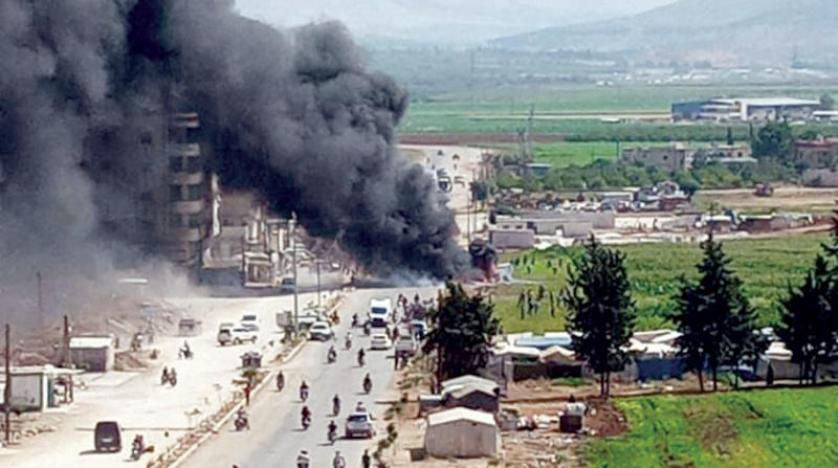After a long period of joint coordination, Russia has resumed military attacks on Turkish areas of operation in Syria. On 16 October, Russia carried out a series of rocket airstrikes targeting the perimeter of the cities of Afrin and Azaz, and the military headquarters of pro-Turkish opposition factions north-west of Aleppo. This implies a change in Russia’s stance regarding Turkey’s role in Syria , as this move appears to reflect Moscow’s desire to send a message to Ankara that it will not allow it to exploit its preoccupation with the war in Ukraine to further its own agenda.
Significant timing
These attacks – the most violent of this month – on areas in the northern countryside of Aleppo, which is under the control of pro-Turkish armed factions, followed military clashes between Hay’at Tahrir al-Sham and The Third Corps. This means that these attacks are linked to Moscow’s efforts to attempts by pro-Turkish factions to extend its presence on the ground, which would in Russia’s view tip the balance of power against it, at least in the short term.
These developments are taking place in the context of Ankara’s growing criticism of Moscow’s policy in Ukraine. In particular, the attacks came soon after Ankara’s decision to support a resolution in the UN General Assembly condemning Russian annexation of Ukraine territory on 11 October, as well as statements made by the Turkish delegate to the UN, Friedon Sinerleoglu, early this month, in which he said, “Russia’s recent military operations against Ukrainian cities are extremely worrying and unacceptable.”
These differences between Moscow and Ankara highlight from the “duality” apparent in their bilateral relations, as their differences over Syria did not prevent Russian President Vladimir Putin from proposing Turkey’s transformation into a major international gas export center on October 13.
Major Indications
Russia’s military infringement into areas of Turkish operations in Syria has a number of implications regarding developments in Syria as well as Russian-Turkish, which include:
Ankara’s failure to control affiliated armed groups: This escalation has allowed Russia to highlight ongoing armed clashes between pro-Turkish armed factions, such as Hay’at Tahrir al-Sham and The Third Corps. This emphasizes Turkey’s inability to control those factions, especially after the collapse of the armistice reached in the past. This may prompt Moscow to launch further military incursions in those areas, particularly in the event that Hay’at Tahrir al-Sham tries to extend its presence in Afrin and control other areas.
Response to Turkish anti-Russian movements: These Russian attacks can be considers a response to a number of Turkish measures, which Russia considered incompatible with its interests. This includes the agreement reached by Turkey and Azerbaijan on 6 October, to raise the Tanab gas line capacity to transport Azerbaijani gas to Europe via Anatolia, from 16 billion cubic metres to 32 billion cubic metres. The second round of the Turkish-Azerbaijani Energy Forum aimed at raising the level of bilateral cooperation between the parties in a way that could impose direct repercussions on Russia’s options for managing its conflict with the Western states, which is seeking alternative energy sources.
Demonstrating strength: Russia’s recent attacks followed threats by Turkey of a new military operation in northern Syria to put an end to the military activities of the Kurdish Syrian Democratic Forces (SDF). International parties, including Russia and the US, have previously issued direct warnings regarding the consequences of such as operation. These attacks therefore represent a demonstration by Moscow that it is the primary force on the Syrian arena, with the capacity to tip the balance of political and strategic power.
These operations also coincided with the escalation of Russian attacks on Ukraine, thereby suggesting Russia wishes to demonstrate it possesses sufficient power to manage two simultaneous conflicts.
Direct Messages
In sum, it can be argued that Russian military operations in Turkish areas of operations in Syria, are meant to confirm that Russia continues to accord special importance to Syria, and the security arrangements being developed there, which will not be diminished by its military operations in Ukraine. In order to preserve influence in Syria, Russia may undertake more military operations in Syria, even if this has a negative impact on its strong relations with Turkey.


